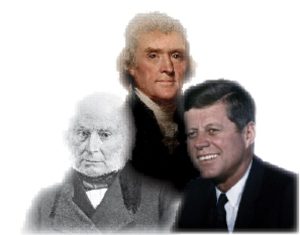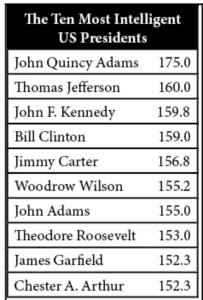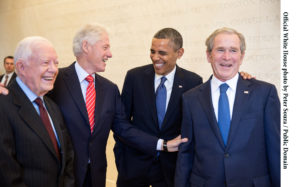
One of the many hotly-debated topics that surfaces on the internet from time to time is the question, “Who was the most intelligent of the 46 U.S. Presidents from George Washington to Joe Biden?” Was it Thomas Jefferson, as suggested by John F. Kennedy? Or was it John Quincy Adams, or Kennedy, himself? Maybe it was one of the lesser known presidents like James Garfield who discovered a proof of the Pythagorean Theorem. In attempting to make this comparison, it would be necessary to identify the behaviors through which intelligence is manifest, such as creativity, inventiveness, a capacity for deep abstraction, or a soundness of judgment. Not only would it be difficult to assess each of these components, but once assessed, each component would have to be weighted and combined with the other components to yield a single number. Since weighting these factors is highly subjective, the ranking of the presidents by intelligence would vary, depending on the perception of the person or committee creating the metric. Furthermore the assessment of each component of intelligence would have to be inferred from the perceived impact of the individual’s judgment, leadership skills, and decisions. At this point, we merely acknowledge that creating a metric for intelligence is a daunting task, and must begin with a reasonably clear idea of what is meant by “intelligence” in the human species.
In 2006, psychologist Dean Keith Simonton conducted what is called a historiometric study of the 42 US presidents from George Washington to George W. Bush in an attempt to estimate their IQs. Entering data from biographies detailing their educational backgrounds, personality descriptions, intellectual achievements, and accomplishments into a sophisticated software program designed to estimate IQs from such profiles, he ranked them by IQ.
Since many arbitrary judgments are involved in quantifying cognitive characteristics, the specific IQ for any particular president should be taken as a very rough estimate at best. Changing input data by even a small amount would change significantly the estimated IQ. However, the value in this study resides in its comparison of the potential for achievement (IQ) with actual achievement. The table below lists, in descending order, the 10 presidents with the highest estimated IQ. Many presidents, like Washington at 20th (est. IQ 132.5) and Lincoln at 12th (est. IQ 140) who are not on this list, achieved significantly more than several who made the top ten, suggesting that performance in a role is not dependent on IQ alone. Simonton states, “Intellect is not, by any means, the only predictor of presidential leadership. Many other variables are involved as well, including both personality traits and situational factors.”

However, IQ is not a complete measure of intelligence, because it has dimensions, such as judgment, that we have not yet learned how to identify or measure. Yet, a significant advantage of IQ as a measure of general intelligence g, is its objectivity. If we were to ask 100 people to compare the intelligence of various US Presidents, we would obtain a variety of widely disparate answers based on perception, and possibly political orientation. However, if we were able to administer IQ tests to those Presidents, we would have some real surprises in discovering significant differences in their capacities for abstraction and problem solving.
When we observe those who are articulate, we tend to judge them as highly intelligent, while those who lack verbal fluidity are perceived as intellectually limited. Of course, eloquence often derives from high intelligence but it’s not always the case. In high profile roles, like the US presidency, there is a premium on communication skills in creating an impression of intellectual power, while qualities like instinct and strategic decision-making are less observable and may escape inclusion in our personal assessment. Therefore, we must move to certainty very carefully in our estimates of someone’s IQ.
The difficulty in estimating the IQs of the US Presidents was evident in Simonton’s study. Every US President had an estimated IQ of 130 or greater, placing them all in the top 3% of the general population in intelligence. For example, the estimate for the IQ of George W. Bush was 138.5, placing him in the top 0.9% of the population, but lower than most US Presidents. However, Simonton acknowledging the fragility of such estimates stated:
George W. Bush may be much smarter than [our estimate] implies. The counterargument must aim at the score he received on Openness, a score that provided the only information for the imputation of his IQ and Intellectual Brilliance estimates.
In the photo below, Jimmy Carter, Bill Clinton, Barack Obama, and George W. Bush share a moment of levity as they wait backstage before the dedication of the George W. Bush Presidential Library in April 2013.It’s not clear what everyone is laughing about, but close examination suggests the object of their humor.

President Barack Obama laughs with former Presidents Jimmy Carter, Bill Clinton, and George W. Bush, prior to the dedication of the George W. Bush Presidential Library and Museum on the campus of Southern Methodist University in Dallas, Texas, April 25, 2013. (Official White House Photo by Pete Souza) This official White House photograph is being made available only for publication by news organizations and/or for personal use printing by the subject(s) of the photograph. The photograph may not be manipulated in any way and may not be used in commercial or political materials, advertisements, emails, products, promotions that in any way suggests approval or endorsement of the President, the First Family, or the White House.
Rising above the ridicule of his fellow members of the presidents’ club, good-natured George opened with self-deprecating humor, “There was a time in my life when I wasn’t likely to be found at a library, much less found one.” Though not known for his “school smarts,” George’s acquired skills in leadership and human relationships, brought him an approval rating greater than 85% following the September 11 attacks–the greatest approval rating of any US President before or since.
